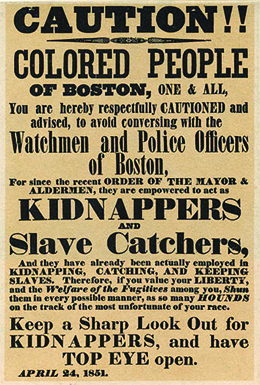| << Chapter < Page | Chapter >> Page > |
The hope that the Compromise of 1850 would resolve the sectional crisis proved short-lived when the Fugitive Slave Act turned into a major source of conflict. The federal law imposed heavy fines and prison sentences on northerners and midwesterners who aided runaway slaves or refused to join posses to catch fugitives. Many northerners felt the law forced them to act as slave-catchers against their will.
The law also established a new group of federal commissioners who would decide the fate of fugitives brought before them. In some instances, slave-catchers even brought in free northern blacks, prompting abolitionist societies to step up their efforts to prevent kidnappings ( [link] ). The commissioners had a financial incentive to send fugitives and free blacks to the slaveholding South, since they received ten dollars for every African American sent to the South and only five if they decided the person who came before them was actually free. The commissioners used no juries, and the alleged runaways could not testify in their own defense.

The operation of the law further alarmed northerners and confirmed for many the existence of a “Slave Power” —that is, a minority of elite slaveholders who wielded a disproportionate amount of power over the federal government, shaping domestic and foreign policies to suit their interests. Despite southerners’ repeated insistence on states’ rights, the Fugitive Slave Act showed that slaveholders were willing to use the power of the federal government to bend people in other states to their will. While rejecting the use of federal power to restrict the expansion of slavery, proslavery southerners turned to the federal government to protect and promote the institution of slavery.
The actual number of runaway slaves who were not captured within a year of escaping remained very low, perhaps no more than one thousand per year in the early 1850s. Most stayed in the South, hiding in plain sight among free blacks in urban areas. Nonetheless, southerners feared the influence of a vast Underground Railroad : the network of northern whites and free blacks who sympathized with runaway slaves and provided safe houses and safe passage from the South. Quakers, who had long been troubled by slavery, were especially active in this network. It is unclear how many slaves escaped through the Underground Railroad, but historians believe that between 50,000 and 100,000 slaves used the network in their bids for freedom. Meanwhile, the 1850 Fugitive Slave Act greatly increased the perils of being captured. For many thousands of fugitives, escaping the United States completely by going to southern Ontario, Canada, where slavery had been abolished, offered the best chance of a better life beyond the reach of slaveholders.
Harriet Tubman, one of the thousands of slaves who made their escape through the Underground Railroad, distinguished herself for her efforts in helping other enslaved men and women escape. Born a slave in Maryland around 1822, Tubman, who suffered greatly under slavery but found solace in Christianity, made her escape in the late 1840s. She returned to the South more than a dozen times to lead other slaves, including her family and friends, along the Underground Railroad to freedom.

Notification Switch
Would you like to follow the 'U.s. history' conversation and receive update notifications?